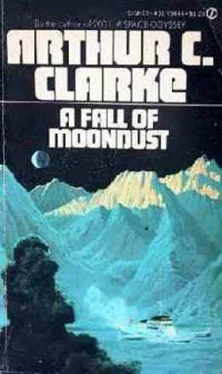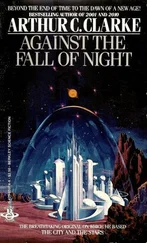Arthur Clarke - A Fall of Moondust
Здесь есть возможность читать онлайн «Arthur Clarke - A Fall of Moondust» весь текст электронной книги совершенно бесплатно (целиком полную версию без сокращений). В некоторых случаях можно слушать аудио, скачать через торрент в формате fb2 и присутствует краткое содержание. Жанр: Фантастика и фэнтези, на английском языке. Описание произведения, (предисловие) а так же отзывы посетителей доступны на портале библиотеки ЛибКат.
- Название:A Fall of Moondust
- Автор:
- Жанр:
- Год:неизвестен
- ISBN:нет данных
- Рейтинг книги:5 / 5. Голосов: 1
-
Избранное:Добавить в избранное
- Отзывы:
-
Ваша оценка:
- 100
- 1
- 2
- 3
- 4
- 5
A Fall of Moondust: краткое содержание, описание и аннотация
Предлагаем к чтению аннотацию, описание, краткое содержание или предисловие (зависит от того, что написал сам автор книги «A Fall of Moondust»). Если вы не нашли необходимую информацию о книге — напишите в комментариях, мы постараемся отыскать её.
A Fall of Moondust — читать онлайн бесплатно полную книгу (весь текст) целиком
Ниже представлен текст книги, разбитый по страницам. Система сохранения места последней прочитанной страницы, позволяет с удобством читать онлайн бесплатно книгу «A Fall of Moondust», без необходимости каждый раз заново искать на чём Вы остановились. Поставьте закладку, и сможете в любой момент перейти на страницу, на которой закончили чтение.
Интервал:
Закладка:
To make this possible, the circular face of the piston had been built so that it could be lifted out, like a saucepan lid, when eight large bolts were unscrewed. It took Lawrence only a few minutes to deal with these and to attach a rope to the new loose metal disc; then he shouted, “Haul away!”
A fatter man would have had to climb the shaft while the circular lid came up after him, but Lawrence was able to squeeze against the wall while the metal plate, moving edgeways, was hoisted past him. There goes the last line of defense, he told himself, as the disc vanished overhead. Now it would be impossible to seal the shaft again if the coupling failed and the dust started to pour in.
“Bucket!” he shouted. It was already on its way down.
Forty years ago, thought Lawrence, I was playing on a California beach with bucket and spade, making castles in the sand. Now here I am on the Moon — Chief Engineer, Earthside, no less — shoveling in even deadlier earnest, with the whole human race looking over my shoulder.
When the first load was hoisted up, he had exposed a considerable area of Selene's roof. The volume of dust trapped inside the coupling-tube was quite small, and two more bucketfuls disposed of it.
Before him now was the aluminized fabric of the sun shield, which had long ago crumpled under the pressure. Lawrence cut it away without difficulty — it was so fragile that he could tear it with his bare hands — and exposed the slightly roughened Fiberglas of the outer hull. To cut through that with a small power saw would be easy; it would also be fatal.
For by this time Selene's double hull had lost its integrity; when the roof had been damaged, the dust would have flooded into the space between the two walls. It would be waiting there, under pressure, to come spurting out as soon as he made his first incision. Before he could enter Selene, that thin but deadly layer of dust would have to be immobilized.
Lawrence rapped briskly against the roof; as he had expected, the sound was muffled by the dust. What he did not expect was to receive an urgent, frantic tattoo in reply.
This, he could tell at once, was no reassuring “I'm O. K.” signal from inside the cruiser. Even before the men overhead could relay the news to him, Lawrence had guessed that the Sea of Thirst was making one final bid to keep its prey.
Because Karl Johanson was a nucleonics engineer, had a sensitive nose, and happened to be sitting at the rear of the bus, he was the one who spotted the approach of disaster. He remained quite still for a few seconds, nostrils twitching, then said “Excuse me” to his companion in the aisle seat, and strolled quietly to the washroom. He did not wish to cause alarm if there was no need, especially when rescue seemed so near. But in his professional lifetime he had learned, through more examples than he cared to remember, never to ignore the smell of burning insulation.
He was in the washroom for less than fifteen seconds. When he emerged he was walking quickly, but not quickly enough to cause panic. He went straight to Pat Harris, who was deep in conversation with Commodore Hansteen, and interrupted them without ceremony.
“Captain”, he said in a low, urgent voice, “we're on fire. Go and check in the toilet. I've not told anyone else.”
In a second, Pat was gone, and Hansteen with him. In space, as on the sea, no one stopped to argue when he heard the word “Fire.” And Johanson was not the sort of man to raise a false alarm; like Pat, he was a Lunar Administration tech, and had been one of those whom the Commodore had selected for his riot squad.
The toilet was typical of that on any small vehicle of land, sea, air, or space; one could touch every wall without changing position. But the rear wall, immediately above the washbowl, could no longer be touched at all. The Fiberglas was blistered with heat, and was buckling and bulging even while the horrified spectators looked at it.
“My God!” said the Commodore. “That will be through in a minute. What's causing it?”
But Pat had already gone. He was back a few seconds later, carrying the cabin's two small fire extinguishers under his arms.
“Commodore”, he said, “go and report to the raft. Tell them we may only have a few minutes. I'll stay here in case it breaks through.”
Hansteen did as he was told. A moment later Pat heard his voice calling the message into the microphone, and the sudden turmoil among the passengers that followed. Almost immediately the door opened again, and he was joined by McKenzie.
“Can I help?” asked the scientist.
“I don't think so”, Pat answered, holding the extinguisher at the ready. He felt a curious numbness, as if this was not really happening to him, but was all a dream from which he would soon awaken. Perhaps by now he had passed beyond fear; having surmounted one crisis after another, all emotion had been wrung out of him. He could still endure, but he could no longer react.
“What's causing it?” asked McKenzie, echoing the Commodore's unanswered question and immediately following it with another. “What's behind this bulkhead?”
“Our main power supply. Twenty heavy-duty cells.”
“How much energy in them?”
“Well, we started with five thousand kilowatt-hours. We probably still have half of it.”
“There's your answer. Something's shorting out our power supply. It's probably been burning up ever since the overhead wiring got ripped out.”
The explanation made sense, if only because there was no other source of energy aboard the cruiser. She was completely fireproof, so could not support an ordinary combustion. But there was enough electrical energy in her power cells to drive her at full speed for hours on end, and if this dissipated itself in raw heat the results would be catastrophic.
Yet this was impossible; such an overload would have tripped the circuit breakers at once — unless, for some reason, they had jammed.
They had not, as McKenzie reported after a quick check in the air lock.
“All the breakers have jumped”, he said. “The circuits are as dead as mutton. I don't understand it.”
Even in this moment of peril, Pat could hardly refrain from smiling. McKenzie was the eternal scientist; he might be about to die, but he would insist on knowing how. If he was being burned at the stake — and a similar fate might well be in store — he would ask his executioners, “What kind of wood are you using?”
The folding door creased inward as Hansteen came back to report.
“Lawrence says he'll be through in ten minutes”, he said. “Will that wall hold until then?”
“God knows”, answered Pat. “It may last for another hour — it may go in the next five seconds. Depends how the fire's spreading.”
“Aren't there automatic fire-fighting appliances in that cornpartment?”
“There's no point in having them — this is our pressure bulkhead, and there's normally vacuum on the other side. That's the best fire fighter you can get.”
“That's it!” exclaimed McKenzie. “Don't you see? The whole compartment's flooded. When the roof tore, the dust started to work its way in. It's shorting all the electrical equipment.”
Pat knew, without further discussion, that McKenzie was right. By now all the sections normally open to space must be packed with dust. It would have poured in through the broken roof, flowed along the gap between the double hull, slowly accumulated around the open bus bars in the power compartment. And then the pyrotechnics would have started: there was enough meteoric iron in the dust to make it a good conductor. It would be arcing and shorting in there like a thousand electric fires.
“If we sprinkled water on that wall”, said the Commodore, “would it help matters — or would it crack the Fiberglas?”
Читать дальшеИнтервал:
Закладка:
Похожие книги на «A Fall of Moondust»
Представляем Вашему вниманию похожие книги на «A Fall of Moondust» списком для выбора. Мы отобрали схожую по названию и смыслу литературу в надежде предоставить читателям больше вариантов отыскать новые, интересные, ещё непрочитанные произведения.
Обсуждение, отзывы о книге «A Fall of Moondust» и просто собственные мнения читателей. Оставьте ваши комментарии, напишите, что Вы думаете о произведении, его смысле или главных героях. Укажите что конкретно понравилось, а что нет, и почему Вы так считаете.












